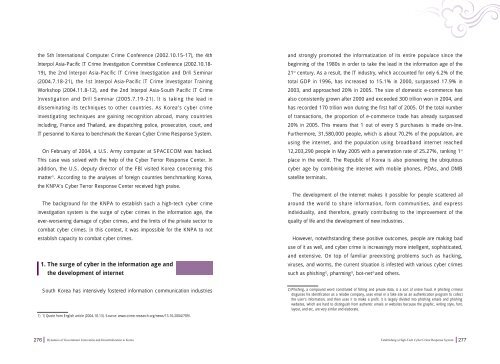Establishing a High-Tech Cyber Crime Response System
Establishing a High-Tech Cyber Crime Response System - Korea.net
Establishing a High-Tech Cyber Crime Response System - Korea.net
- No tags were found...
You also want an ePaper? Increase the reach of your titles
YUMPU automatically turns print PDFs into web optimized ePapers that Google loves.
the 5th International Computer <strong>Crime</strong> Conference (2002.10.15-17), the 4th<br />
Interpol Asia-Pacific IT <strong>Crime</strong> Investigation Committee Conference (2002.10.18-<br />
19), the 2nd Interpol Asia-Pacific IT <strong>Crime</strong> Investigation and Drill Seminar<br />
(2004.7.18-21), the 1st Interpol Asia-Pacific IT <strong>Crime</strong> Investigator Training<br />
Workshop (2004.11.8-12), and the 2nd Interpol Asia-South Pacific IT <strong>Crime</strong><br />
Investigation and Drill Seminar (2005.7.19-21). It is taking the lead in<br />
disseminating its techniques to other countries. As Korea’s cyber crime<br />
investigating techniques are gaining recognition abroad, many countries<br />
including, France and Thailand, are dispatching police, prosecution, court, and<br />
IT personnel to Korea to benchmark the Korean <strong>Cyber</strong> <strong>Crime</strong> <strong>Response</strong> <strong>System</strong>.<br />
On February of 2004, a U.S. Army computer at SPACECOM was hacked.<br />
This case was solved with the help of the <strong>Cyber</strong> Terror <strong>Response</strong> Center. In<br />
addition, the U.S. deputy director of the FBI visited Korea concerning this<br />
matter 1) . According to the analyses of foreign countries benchmarking Korea,<br />
the KNPA’s <strong>Cyber</strong> Terror <strong>Response</strong> Center received high praise.<br />
The background for the KNPA to establish such a high-tech cyber crime<br />
investigation system is the surge of cyber crimes in the information age, the<br />
ever-worsening damage of cyber crimes, and the limits of the private sector to<br />
combat cyber crimes. In this context, it was impossible for the KNPA to not<br />
establish capacity to combat cyber crimes.<br />
1. The surge of cyber in the information age and<br />
the development of internet<br />
and strongly promoted the informatization of its entire populace since the<br />
beginning of the 1980s in order to take the lead in the information age of the<br />
21 st century. As a result, the IT industry, which accounted for only 6.2% of the<br />
total GDP in 1996, has increased to 15.1% in 2000, surpassed 17.9% in<br />
2003, and approached 20% in 2005. The size of domestic e-commerce has<br />
also consistently grown after 2000 and exceeded 300 trillion won in 2004, and<br />
has recorded 170 trillion won during the first half of 2005. Of the total number<br />
of transactions, the proportion of e-commerce trade has already surpassed<br />
20% in 2005. This means that 1 out of every 5 purchases is made on-line.<br />
Furthermore, 31,580,000 people, which is about 70.2% of the population, are<br />
using the internet, and the population using broadband internet reached<br />
12,203,290 people in May 2005 with a penetration rate of 25.27%, ranking 1 st<br />
place in the world. The Republic of Korea is also pioneering the ubiquitous<br />
cyber age by combining the internet with mobile phones, PDAs, and DMB<br />
satellite terminals.<br />
The development of the internet makes it possible for people scattered all<br />
around the world to share information, form communities, and express<br />
individuality, and therefore, greatly contributing to the improvement of the<br />
quality of life and the development of new industries.<br />
However, notwithstanding these positive outcomes, people are making bad<br />
use of it as well, and cyber crime is increasingly more intelligent, sophisticated,<br />
and extensive. On top of familiar preexisting problems such as hacking,<br />
viruses, and worms, the current situation is infested with various cyber crimes<br />
such as phishing 2) , pharming 3) , bot-net 4) and others.<br />
South Korea has intensively fostered information communication industries<br />
1) 1) Quote from English article (2004.10.13). Source: www.crime-research.org/news/13.10.2004/709/.<br />
2) Phishing, a compound word constituted of fishing and private data, is a sort of online fraud. A phishing criminal<br />
disguises his identification as a reliable company, uses email or a fake site as an authentication program to collect<br />
the user’s information, and then uses it to make a profit. It is largely divided into phishing emails and phishing<br />
websites, which are hard to distinguish from authentic emails or websites because the graphic, writing style, font,<br />
layout, and etc, are very similar and elaborate.<br />
276 Dynamics of Government Innovation and Decentralization in Korea<br />
<strong>Establishing</strong> a <strong>High</strong>-<strong>Tech</strong> <strong>Cyber</strong> <strong>Crime</strong> <strong>Response</strong> <strong>System</strong><br />
277
















